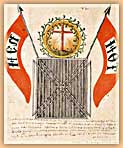 |

In mid-September 1814 in Odessa, three Greek merchants, two from Epirus and one from Patmos, decided to prepare the ground for the outbreak of the Greek revolt within the Ottoman Empire 'in due time'. This decision led very quickly to the foundation of the Philiki Etaireia. This society was part of the wider national and revolutionary activity which developed from the late 18th century, especially among the scholars and merchants of the Greek communities of the Diaspora. Its founders were Nikolaos Skouphas, Athanasios Tsakaloph and Emmanouil Xanthos. In the past they had participated in other secret revolutionary societies as well as in Masonic lodges.
This experience was useful in the organization and conspiratorial ways of the Philiki Etaireia. Until 1818, the year in which the three founders settled in Constantinople, the Philiki Etaireia was an organization with few members and complex initiation procedures, conspiratorial rules and numerous secret symbols. It is considered that until that time the number of the initiated members did not exceed thirty, mainly eminent Greeks from Russia and the Danubian principalities. From 1814-1818, Anthimos Gazis, a priest and scholar of acknowledged prestige, was included in the leading cell, the so-called Archi of the Philiki Etaireia.
The transference of the society in Constantinople coincides
with the death of N. Skouphas and the expansion of the leading
group which now included the metropolitan Ignatius of Hungaro-Walachia,
the Phanariote Alexandros Mavrokordatos and the archimandrite
Grigorios Dikaios (Papaflessas). Furthermore, in the period
1818-1820, the Philiki Etaireia changed its organization,
with new members and the specification of a plan for the outbreak
of the Revolution. It adopted the so-called system of the
twelve apostles. According to this system, twelve honourable
members of the Philiki Etaireia were sent in twelve regions
where Greek populations lived. The objective of the Philiki
Etaireia was to approach local agents with social, political
or economic standing. In this period the most important local
notables and bishops of the Peloponnese, as well as many klephts
and armatoles from Rumeli, were brought into its ranks. At
the same time, the four ranks of members under the Archi were
increased to six and the initiation ritual was simplified.
In addition, Ioannis Kapodistrias was asked to become the
leader of the Philiki Etaireia. After his refusal, members
approached Alexander Ypsilantis, who accepted the leadership
in April 1820.
|
 |